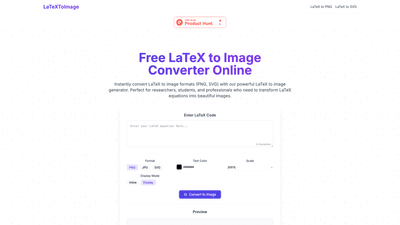What is it
LaTeXToImage is an online LaTeX to image converter that instantly turns LaTeX equations and formulas into high-quality image formats. Users can input standard LaTeX code and export results as PNG, JPG, or SVG. The tool is designed for researchers, students, educators, and professionals who need publication-ready or web-ready visuals of complex mathematical and scientific notation. It offers real-time previews, customization options (size, color, background), and no registration is required for basic use, making it a fast, accessible solution for transforming LaTeX into shareable visuals.
Features
- Lightning-fast conversion: Transforms LaTeX equations into images in milliseconds for rapid workflows.
- Multiple export formats: Supports PNG, JPG, and SVG, giving raster and vector options for different use cases.
- Transparent background and adjustable size: Create images with transparent backgrounds and customize dimensions to fit documents, slides, or web content.
- Live preview and customization: Real-time preview with controls for color, scale, and background to fine-tune output before download.
- Inline and display modes: Handles both inline math and displayed equations to match your document styling.
- Easy workflow without registration: Paste LaTeX code, preview, and download with a few clicks—no account required for basic use.
- Broad LaTeX compatibility: Accepts standard LaTeX syntax, including common math commands, Greek letters, integrals, sums, matrices, and more.
How to Use
- Input Your LaTeX Code: Paste or type your LaTeX equation into the editor. The tool supports standard LaTeX syntax, including fractions, Greek symbols, and common math operators.
- Preview & Customize: Observe an instant preview and adjust settings such as color, size, display mode, and background transparency to suit your needs.
- Download Your Image: Choose the desired format (PNG, JPG, or SVG) and download with a single click. No registration is required for basic usage.
Pricing
- Free tier: Access to core LaTeX to image conversion with basic customization and instant downloads.
- Paid/Pro options: Advanced features such as higher resolution, additional export formats, more precise control over background and transparency, and extended customization (may vary by current policy; check site for details).
Tips for Best Results
- Use proper LaTeX syntax: For fractions, write \frac{numerator}{denominator}; for square roots, use \sqrt{expression}.
- Greek letters and symbols: Use standard commands such as \alpha, \beta, \gamma and operators like \int, \sum, \prod.
- Background and transparency: Opt for a transparent background when embedding images into documents or slides; choose a solid background color if transparency is not desired.
- Resolution and size: For print materials, increase the image resolution; for web use, a standard resolution is usually sufficient.
- Display mode vs. inline: Choose Inline Display for inline math in text and Display for centered equations in separate lines.
Practical Use Cases and Benefits
- Academic papers and theses: Generate publication-ready equation images that scale cleanly in SVG or raster formats for high-quality figures.
- Presentations and slides: Create crisp math visuals in PNG/JPG or scalable SVG for impactful slides and speaker notes.
- Educational materials: Produce clear mathematical diagrams, formulas, and matrices for textbooks, worksheets, and online courses.
- Web content and blogs: Use SVG images for scalable math graphics that retain sharpness on high-DPI displays without increasing file sizes dramatically.
- Collaborative projects: Share consistent LaTeX-rendered visuals across documents, dashboards, and online repositories without needing specialized software.
Who Uses LaTeXToImage
- Students seeking quick, publication-ready equation images for homework, assignments, and notes.
- Researchers needing reliable LaTeX visuals for manuscripts, figures, and grant proposals.
- Educators creating instructional content, problem sets, and lecture materials.
- Bloggers and web developers embedding high-quality math images into articles and tutorials.
Frequently Asked Questions
- How do I transform LaTeX to image files?
- Paste your LaTeX code into the editor, adjust settings if needed, and click Convert. The tool generates a downloadable image instantly.
- What image formats are supported?
- PNG, JPG, and SVG are available. SVG is ideal for scalable, high-quality graphics; PNG/JPG are suitable for static documents and web content.
- Can I customize the output style?
- Yes. You can adjust color, size, resolution, and background (including transparency) to match your needs.
- How can I include LaTeX images in documents?
- After conversion, download the image and insert it into Word, PowerPoint, HTML pages, or any document that supports images.
- Is registration required?
- No, the basic LaTeX to image conversion is available without registration. Some advanced features may require a paid tier.
Why choose LaTeXToImage
- Speed and simplicity: Convert LaTeX to images in milliseconds with an intuitive, no-friction workflow.
- Flexible outputs: Choose the best format for your use case, whether for print, web, or scalable designs.
- Professional rendering: High-quality, publication-ready images that maintain clarity across platforms and devices.
- Seamless integration: Transparent backgrounds and customizable dimensions enable seamless embedding into diverse documents and websites.
- Broad compatibility: Supports a wide range of LaTeX syntax, making it suitable for simple equations as well as complex mathematical expressions.
Ready to elevate your LaTeX visuals?
- Try PNG/JPG for straightforward documents and presentations.
- Try SVG for scalable, high-quality graphics suitable for editors and web pages.
- Take advantage of real-time previews and precise customization to achieve perfect results every time.
